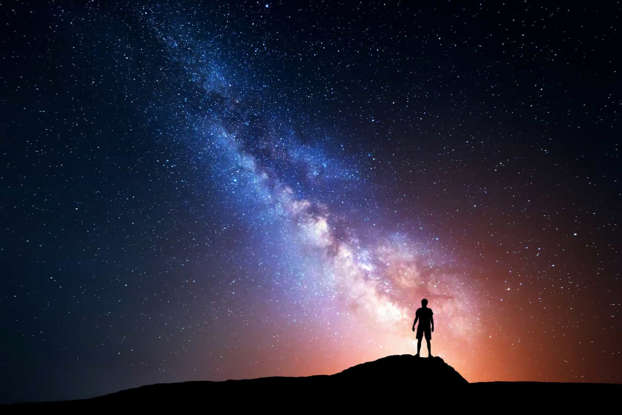
Many events of the past can give us great wisdom in how to handle the day-to- day situations we face. What about future events? Are there clues to investigate that will guide our thinking and choices, strengthen our inner self, and protect our families?
This is the journey I have been on over a life-time: sifting records, studying Archeology and Theology, and living and working with people of other faiths or non at all. This is what I learned that will help anyone.
Beginnings
The Bible gives an account of the creation of the world and man, and centres on the earliest history of people in the Middle East.
Adam was the first man, Eve his wife, and they lived a peaceful life, naming the animals and talking with God in person. But when tempted, they failed. As a result they were forced to leave their home in the Garden of Eden, and lost direct communication with their Maker. Even though experiencing God’s judgment, they received the promise of His enduring love when God gave them a ‘covering’ for their nakedness through the sacrifice of an animal. It was symbolic of the changes occurring, and of future events.
The theme of God providing everything man needs for forgiveness for his rebellion is introduced through the shedding of blood. The life is in the blood of an animal. The killing of an animal ends a life. Man began to kill animals and offer other kinds of sacrifices to approach and worship God. But animal sacrifice in itself could never take away a man’s sin. God states that in the Bible. It pointed ahead to the ultimate sacrifice of God, Himself, for mankind that would occur in the shedding of the blood of Jesus.
God Himself, came to earth to live as a man, experienced what we experience, suffered deeply, and took upon Himself all the punishment God required for the sins of mankind by dying an agonizing death and going to the suffering of Hell. But He rose to life again, and awaits His return, and promises to reward those who love and obey Him.
I can remember the moment in time when I saw in Genesis 22 the plan of salvation in the Old Testament. It was these words of Abraham, who was talking with his son, Isaac, “God will provide, HIMSELF, a lamb, for the burnt offering.” Long afterwards, John the Baptist, watching Jesus approaching, said to the crowds, “Behold, the Lamb of God, who takes away the sin of the world (John 1:29).”
Where was the Garden of Eden? Scholars believe that it was on the junction of four rivers : Euphrates and Tigris with the Pishon and Gihon (Gen 2:10-14) in the Middle East. The latter two rivers have not been identified. The Euphrates and Tigris Rivers rise in the Caucasus Mountains and flow southeast to empty into the Persian Gulf. However, since Adam’s day, thick sediment settled on the river beds at the mouth of the Persian Gulf and pushed the entrance to the union of the Euphrates and Tigris Rivers far upstream about 100 miles.
It is thought that the Garden of Eden is located as a group of mounds, about 12 miles south of Ur at a place called Eridu. This region is approximately the centre of the earth’s surface, where it is believed all races of humans originated. Archaeologists have focused their work in this region, and uncovered many artifacts that reveal ancient civilizations.
Other locations that are important in Genesis include:
Ur – home of Abraham, was just 12 miles from Eridu, a well developed city of culture and learning, although it took recent archaeology digs to prove it even existed.
Fara, traditional home of Noah, which was 70 miles away.
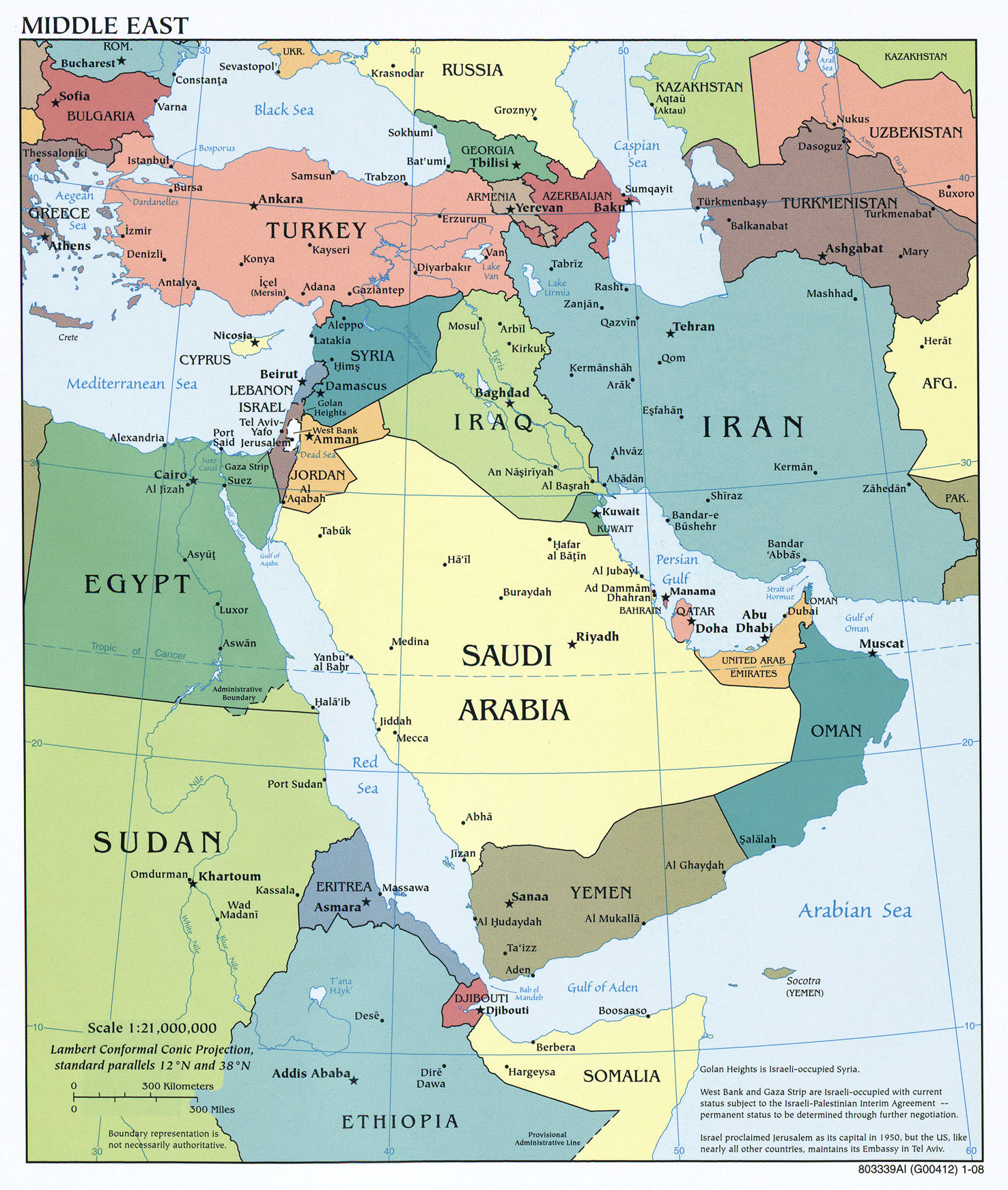
Deep anguish for Adam and Eve when one of their sons, Cain, killed his brother Abel. The couple had another son, Seth, whose descendants are followed in the history that unfolded since then.
All of them lived incredibly long lives: Adam 930 years; Seth 912 and his descendants to Noah, who lived 950 years. By this time, man had learned how to use copper and iron, and invented musical instruments. The length of people’s lives, however, rapidly began to decline after the next major upheaval.
About 1, 600 years from Adam, Noah lived in a period of wickedness that grieved God so much He sent a flood to destroy everything. But, by having Noah build an ark, God saved Noah and his family as well as pairs of the animals so life on earth could begin again.
Genesis 6:9-18 tells the history of that terrible period. The boat, 450 feet long, 75 feet wide and 45 feet high, was divided into compartments, and as big as an ocean liner. It floated during the deluge, while everyone else on earth died. Noah was in the ark one year, 17 days; 5 months floating, 7 months resting on a mountain. The Ark rested on Mt Ararat, 500 miles away from where it had been built.
This tremendous deluge of water that fell on the earth is believed to have destroyed a misty film that surrounded the earth. It had protected people from the damage by the sun’s rays. The Bible also says that in an early period, there was a mist that rose up from the land to water it. It was man’s wickedness that caused God’s judgment. He has promised never to do it again that way, and why we see a rainbow in the sky, as a testimony of that promise.
Surely there is a lesson to be learned here that the Living God, the Supreme Being, is to be respected and feared. He cares about the lives of the people living on Earth.
Archaeologists have found a layer of mud, five to eight feet thick, deposited by that flood in three places: Ur (home of Abraham), at Fara (Noah’s home) and at Kish, a suburb of Babylonia, with possibly a fourth place in Nineveh. It contains no evidence of civilization within that strata, but identifiable ones both above and below that layer of soil. Interesting.
Noah had three sons, from whom all races developed after the Flood (Genesis 10:1-11:9): Ham, Shem and Japheth.
Hamites went south to places like Central Arabia, Egypt, the eastern shore of the Mediterranean. Three of his sons went to Africa. Caanan, the son of Ham, and his descendants gave his name to a land which later became the homeland of the Jews. A grandson of Ham, Nimrod, was an outstanding leader who build three cities in the Babylonian Valley and also founded Nineveh. For many centuries afterwards, these two places, Babylon and Nineveh were the leading cities of the world.
Shemites included Assyrians, Syrians, Elamites, and they settled in the north Euphrates Valley and its borders.
Japhites went northward and settled in the regions around the Black and Caspian Seas, and became progenitors of the great Caucasian races of Europe and Asia.
It appears that Noah migrated back to his pre-flood home. Noah lived 350 years after the Flood, and died two years before the birth of Abraham.
The next major event in Genesis tells of the confusion of tongues at the Tower of Babel, which occurred in the 4th generation after the Flood. (Genesis 11:1-9) The tower was built in the centre around which the famous city of Babylon was built. There are two locations thought to be its origin. Probably a Ziggurat, a temple, built in human pride seeking power, and idol worship. God caused the builders to suddenly not understand each other’s speech , confusing them, and thus halting the completion of this project. People spread out as a result, populating distant regions.
There are about 25 known Ziggurats still in existence today, located mostly in Iran and Iraq. One of the best preserved is the ziggurat of Ur (where Abraham lived), in the present-day Dhi Qar Province, Iraq.
Long before this period, the ancient Sumerians believed their gods lived in the sky. When the Babylonians took over in the south, and the Assyrians in the north, Ziggurats continued to be built and used in the same manner as they were in ancient Sumer. The tallest ziggurat was 300 feet high. It wasn’t until recent times in the 1800s A.D. that people began to realize the importance of these discoveries.
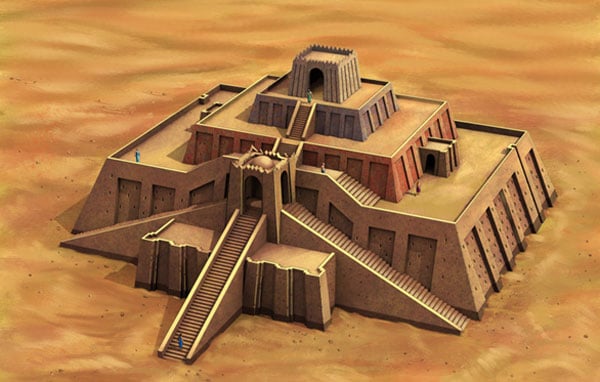
A Ziggurat
The appearance of Abraham, from Ur, ca 1900 BC, has special significance as he is considered the founding father of the Jewish nation. His own nationality has been disputed, possibly an Armenian. He felt compelled by God to leave his home in Mesopotamia near the Persian Gulf and travel with his family to a distant land he did not know where.He followed a trade route, heading north/west on the way to Canaan. Hebrews 11:8. Genesis 12.
Although he was surrounded by idolaters, Abraham was a man who believed in One True God. He had faith that God would take care of him, even though he left the security and safety of his current life, What a lesson for all of us. Many people today are in tremendous upheaval because of war and famine and the longing for a better life. Some find it; others do not.
Whatever situation is yours today, even if isolated and alone, there is great comfort being with others. Maybe a conversation on the bus, in a taxi, or walking on the street. A stranger may need encouragement, shelter, food. God cares for strangers. Be friendly, be open to opportunities that come by sharing your own struggles a bit. We each are on a journey of life. God does not promise there will be no trouble; It may be you are chosen to meet someone to provide for their needs. Or, it may be yours will miraculously be met. Let us trust God in good times and difficult ones, and do good.
About 600 miles northwest from Ur was Haran, Abraham’s first major stopping place, where ‘they settled.’ Here, his father died. Now, aged 75, Abraham started again moving south into Canaan with a large caravan of followers. He was not a nomad, but of some wealth. He stopped at several places on his way south, first at Shechem. He built an altar of worship here, then moved on to Bethel, about 10 miles north of Jerusalem. He built an altar there for worship, and continued on to Hebron, where he bought a piece of land which became a burial plot, and where he chose to settle.
The rest of the story of his life, including the time he spent in Egypt because there was famine in Canaan, focused on obedience to God. He was a righteous man, and God made a special covenant with him.
Not only would he have a longed for son with his very old, barren wife, Sarah, but his descendants would be many. God promised that all nations of the world would be blessed through him, and they have been over the centuries. But first great strain developed when Abraham had a son with someone else, in an effort to fulfill that promise himself.
The drama and jealousy between the heir of promise, Isaac, and his half brother, has continued to this day. Ishmael by Hagar, Sarah’s Egyptian handmaiden, would make his home in Arabia, and become the father of Arabians. When man tries to fulfill God’s will through his own efforts, suffering results.
The history now diverges briefly to focus on Lot, Abraham’s nephew, and the destruction of Sodom and Gomorrah. Genesis 19. Lot had been kidnapped by invaders, and was rescued in a swift raid north by Abraham and 300 of his men. These two relatives separated because of the demand for grazing room for their large herds of livestock. Lot chose to settle near these cities. That he was miraculously saved when God destroyed Sodom and Gomorrah is another evidence of God’s promise to Abraham.
Where was Sodom and Gomorrah? Most likely the southern end of the Dead Sea. Scholars believe that the cities are buried under the Dead Sea. There is a mountain nearby called “Sodom’ or Usdom.
The Dead Sea
In Abraham’s time, about a third of the southern end of the Dead Sea was a plain. Today the waters at the southern end are barely 10 feet in depth, while at the north end they reach 1200 feet in depth. There is belief that during the destruction of the cities, tumultuous events occurred, changing the terrain. The Dead Sea today is below sea level and has a high salt content.
Sarah died age 127 years, and was buried in the Cave of Machpelah that Abraham had bought and is on the west slope of Hebron. It is now under a mosque, who permit no Christian to enter. [Here are buried Abraham, Isaac his son; grandson Jacob, and Jacob’s wives, Rebekah and Leah]
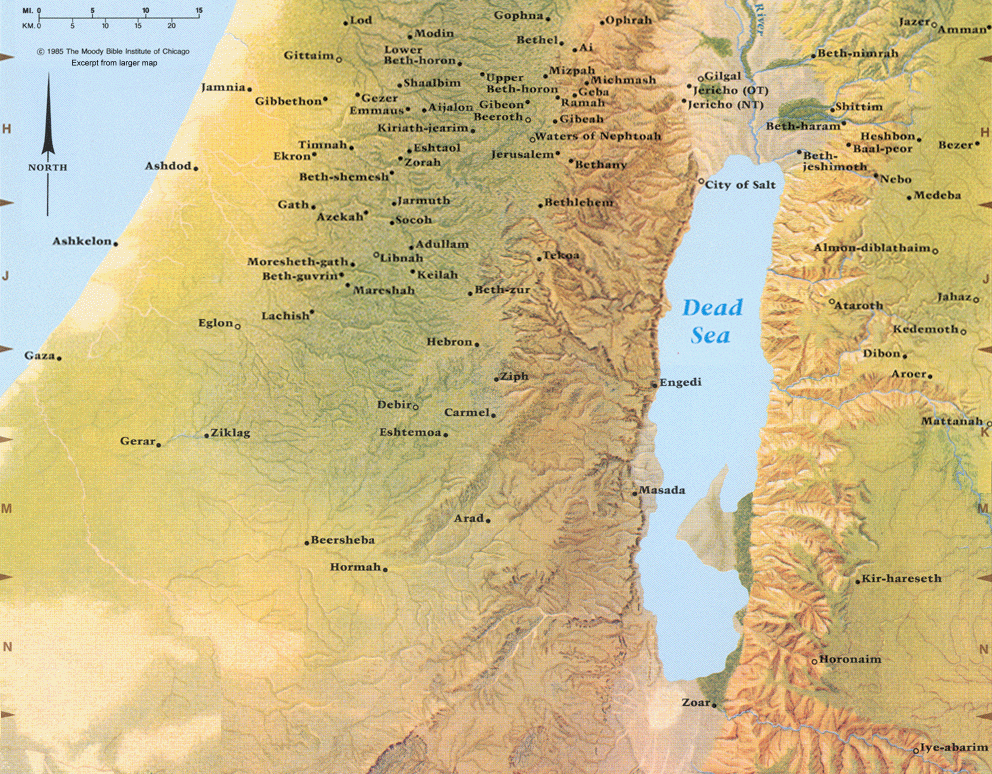
The story of Abraham’s son, Isaac, and his love for his bride, Rebekah, from a marriage his father arranged, and their life together, is passed over fairly quickly. She had twins, Esau and Jacob, and the latter boy becomes the chosen one to continue the lineage of Abraham and the Jewish nation. Esau became the father of the Edomites, whose history continued the conflict between the families in later years.
Although Isaac inherited his father’ s wealth and continued the same pattern of life, he engaged in agriculture near Gerar (Genesis 26:12), which was very successful. However, he found it necessary to move to Beersheba in order to maintain peaceful relations with those around him.
It is Jacob, whose life now takes centre stage towards the end of the Book of Genesis. Jacob stole his brother’s birthright, a special status in that era. That event caused Esau to hate his brother and plan to kill him. Jacob was forced to flee, not knowing it would be almost 20 years before he would see his family again.
He went north to Paddanaram, to his mother’s family near Haran, where he married two daughters of his Syrian uncle, Rachel and Leah. Jacob also had children with their two concubines and all together fathered 11 children there. He finally returned to Canaan a very rich man. Genesis 31.
The meeting with brother Esau, whom Jacob feared, went well and they departed in peace. Jacob settled his family at Shechem, and worshiped God.
Tragedy struck when Jacob’s daughter, Dinah, was raped. Her two brothers, in revenge, wiped out a whole city to murder her attacker. This led to great turmoil, and Jacob was forced to move his family to Bethel. Genesis 34. But God met with Jacob and changed his name to Israel, and extended His blessing on this family of 12 sons.
Benjamin has been born, but Rachel died in childbirth. She was buried near Bethlehem, at a place called Ephrath. Jacob continued on to Hebron, the home of his father, Isaac. Jacob and his brother Esau, who returned from Seir, buried their father there.
In God’s line of promise, all of Abraham’s sons but Isaac were eliminated, and only his son, Jacob, was chosen as the founding family of a great nation God yet to arise.
The Book of Genesis closes with the account of the life of Jacob’s favourite son by Rachel–Joseph. His brothers were deeply jealous of him. They plotted to kill him, but were persuaded by Reuben and Judah to sell him to some traders, who took him to Egypt, a teenager. He was sold as a slave, and spent 12 years in jail for crimes he did not commit.
Over time Joseph rose to the second highest position in the land, just below Pharaoh. As the Chief Administrator, Joseph gathered and stored huge quantities of grain because he had been warned by God of a coming period of great trouble that would last seven years.
Because God gave him great wisdom and blessed his efforts, Joseph was able to save his own Jewish family in the terrible famine that was wide spread, even into Canaan. Jacob reunited with his son. Now aged 130 years old, he moved all the persons belonging to him totaling 66 (plus the wives of the sons) from Canaan to Egypt. ( Genesis 47:9-12), Adding Joseph made Jacob’s family that came to Egypt a total of 70. (Gen 46:27).
Pharaoh gave them the best area of Goshen, and Joseph oversaw their care. Jacob died in Egypt. Joseph took his father’s body home to Canaan and buried him in the cave at Hebron. Thus a span of 215 years passed from Abraham coming to Canaan and Jacob going to Egypt.

All returned to Egypt to live out their remaining days. Nearing his death, Joseph has Jacob’s descendants promise to take his bones back to Canaan when they would finally leave in the future–which turned out to be 430 years later, a nation that might have been as large as two million people, which introduces the Book of Exodus. The Israelites didn’t forget Joseph, and we remember him to this day. Exodus 13:19.
Joseph’s embalmed body was years later buried near Shechem in a field that his father, Jacob, had given him (Genesis 50:26; Joshua 24:32) and near the well Jacob built. A church was build around the well in the 4th Century, and rebuilt by the Crusaders; there is today an unfinished Greek Orthodox basilica on this site.
When speaking to his brothers who had been so cruel to him as a lad, Joseph understood ‘when life hurts’. He said ” Do not be afraid, be grieved, or angry with yourselves because you sold me. You meant evil against me. God meant it for good. He sent me before you to preserve many people alive. Now, therefore it is not you who sent me here, but God.…I will provide for you, and he kissed all his brothers and wept on them and afterwards his brothers talked with him.”
What a testimony of forgiveness, and grace– unmerited favour–and of love. Are these not the qualities we so long to have in our own lives and especially with our children and others. It is a glory to overlook an insult, (Proverbs), and Joseph kept on doing that all his life. He rose above his pain, and turned it into blessing, and saved the lives of thousands because he did.
God has a plan for each one of us. What is your destiny? Are you another Joseph, struggling to rise above the cruelties of life, even in a prison for something you did not do? There are many prisons in life, not just the physical ones. Perhaps the greatest battlefield is our own mind. You may be destined for something great, yet unknown, and are being tested just like Joseph.
Or, are you like the Pharaoh who, years later, forgot him and hated the Jews and tried to kill them all. Most of us, I think, are somewhere in between. It is a wise choice to embrace the lessons from these people, and let the God of Abraham, Isaac and Jacob be honoured, above all else.

The Book of Exodus
The history of Egypt as a growing world power was tempered by the invasion of the Hyksos, people using horse and chariot, which were unknown to the Egyptians, and who arrived from Asia to occupy the land about 1600 B.C. for about a century and a half. It was probably during this period that Joseph became an Administrator and Jacob and his family moved to Egypt. In time, the Hyksos were expelled, and three more dynasties reigned in Egypt, increasing its military power.
Egypt’s was a land of many gods. Temples were numerous in the land. Egyptians believed in a life after death. This is evidenced in the pyramids where adequate provisions were made for the royal afterlife. Even servants were slain and placed near their master’s body.
About 300 years passed between the Book of Genesis and the Book of Exodus, or from the death of Joseph to birth of a new leader, Moses, a Levite–a Jewish priesthood.
Egypt had many Pharaohs, who became increasingly alarmed at the rapid increase of the Jews. They saw them as a threat to national security. Thus Egyptians reduced them to slavery to control them. The Israelite people, forced into increasing hard labour, are credited with building the city of Ramses. Exodus 1:15-22. We realize now that God was preparing his people physically for the arduous journey ahead. Could it be that God is working in the circumstances of your life today and mine for something yet to be revealed?
A cruel Pharaoh ordered the death of all Jewish, male newborns. But one baby, Moses, was hidden and then miraculously adopted by Pharaoh’s daughter, who paid his mother to care for him.
Moses was instructed in all the Egyptian wisdom and learning (Acts 7:22). The Book of Exodus of the Bible tells the life story of Moses. He was destined to lead the descendants of Joseph of the land to Canaan. Moses is considered the greatest prophet in Jewish history (Deuteronomy 34:10).
From a position of high esteem of royalty, however, Moses was forced to flee the land when he killed an Egyptian trying to help his own people. He lived for the next 40 years in the backside of the desert in the area near Midian. Even his journey to get there and then back to Egypt may have taken him twice over some of the same ground he would later lead the Israelites. God prepared him. But God also humbled him. Moses was in his 80s, when God finally called him.
Do you think you are too old now to do anything special before you die? Lift up your head and start trusting that God’s plan for your life is not over yet. He wants only the best for you. If you are in bed and can barely move, you can still pray. Prayer has great power, and it moves God to act. There are people climbing mountains in their 80s. Remember Jeremiah 29:11-14. the verse that saved my life, and gives me the courage to go on.
“For I know the thoughts that I think toward you, says the LORD. Thoughts of peace and not of evil, to give you a future and a hope…then you will call upon Me..pray…and I will listen to you. And you will seek Me and find Me, when you search for Me with all your heart.
Do you think God has forgotten you? He has not. God may be testing you. How will you respond in the silent moments of life, when no one is looking, no one is there, and you need help, and none comes? Are you alone? You can be alone in a crowd. All may fail you, even your family, the Church, civic leaders. You may live in a land of no social services to turn to. I think of those shivering in the cold, hungry, and even homeless. Do you think God has forgotten you? He has not. Trust His love.
Suffering may come upon us from the circumstances of life: wars, famine, unkindness of others, but also from bad choices we have made. Do not let that undermine your knowing that God is a good God, and He loves you; He sees you. God uses people to help people, stirs them, sends them, but the timing in His hands. By not outwardly responding as you expect Him to, He may still be stirring others already to be there for you. They may be slow in responding. Are you one of those people?
Maybe God is giving you time and your own inner healing to reach the ability to do what was previously impossible. Don’t hold onto guilt for any reason. Just go to God about it, then let go of it and break the pattern inside you of how you respond. Ask forgiveness for any failure, then pound a stick in the ground (mentally or physically) and leave all of that burden there. Jesus came to set us free. Sometimes that can be from ourselves. We can create a sense of false guilt about something that is not true at all. Our mind can lie to us.
God may be developing inner qualities you do not have yet, like patience, self control, because He has a purpose for you ahead. What about forgiveness? It is at the heart of love. The more we see our own sins, and seek God’s forgiveness, the less we focus on the sins, the betrayals of others. Control your thinking. Stop talking about the pain of the past. It can be a vicious cycle, never ending, and leading to depression and despair. You can stop that.
Begin by speaking kindly to yourself, positive things. Look for five things to be grateful for today, then five more tomorrow, and so on. Don’t pay attention to the voices of others if they are hurtful, negative and put you down. Look to develop friendships with people who do appreciate you and are positive in both their conversation and life. Jesus can be your Friend. There is no condemnation when you have been forgiven. If your mind wants to condemn you for anything, refuse to allow it to do that. Trust in God’s mercy and compassion. He loves you.
If we confess our sins, He is faithful and just to forgive us our sins, and to cleanse us from all unrighteousness. I John 1:9
Let us pray for the suffering, that they will find greater strength and even healing of mind and body. I I have personally been healed of deep pain in a moment when a woman touched me, as she prayed. Jesus did not heal everyone, and it may be that your physical healing will occur in heaven. But pray and seek whatever your need. That is how we see God–through our need.
We develop compassion and caring for others when we receive forgiveness and love from God ourselves. We must choose that route deliberately, or bitterness can become our companion. Look for areas of practical service to fund shelters, food, water, safety and other kinds of care to help those in need around us, at home and abroad. Cannot go yourself? Then fund someone else, or donate to a charity of your choice. Send an email to someone, and share what good things you have experienced.
Be kind. Hurt no one. Give. Learning to love those who do not love us is the journey of pain and sorrow that Jesus felt in His own time on earth. We yearn to become like Him, to respond as He did.
“Jesus said: For I was hungry and you gave me food. I was thirsty and you gave me drink. I was a stranger and you took me in. I was in prison, and you visited me. They answered: When did we see you, hungry, thirsty, see You as a stranger, naked and clothed you? Sick and in prison. Jesus replied: Inasmuch as you did it to one of the least of these, My brethren, you did it to Me.” Matthew 25: 35-40
Moses married and had sons, and became a shepherd and a nomad. It was at Mt Horeb (Sinai), that Moses received his miraculous call from God.
With his brother Aaron as the spokesman, the pair, now in their 80s, faced the wrath of a new Pharaoh–possibly Merneptah (1235-1220 BC), Late Bronze Age in Egypt, who was aggressive in building the military, and based in the Goshen area of Egypt where the Jews lived. Other Pharaohs lived about 400 miles south and where nomads did not usually go. But newer archaeological discoveries seem to put this event earlier than his reign, before Ramses II who was Pharaoh before Merneptah.
If one uses the Bible in I Kings 6:1 “the Exodus was 480 years to Solomon’s Temple“, that seems to date things about 1450 BC. That would put the departure of the Israelites out of Egypt during the powerful reign of Pharaoh Tuthmosis III (his reign 1479-1425 BC) with Hatshepsut.
Under Thuthmose III, the Egyptian army marched to the Euphrates River in Mesopotamia, and sailed the Mediterranean Sea along the Phoenician coast. He was the greatest conquerer in Egyptian history, and his tomb is at Thebes. He may have been the oppressor of Israel. If so, then famous Queen Hatshepsut may have been the Pharaoh’s Daughter who rescued and brought up Moses. There is considerable debate about who was the Pharaoh and when did the events occur during the period of Moses and the Exodus.
This should not distract from the powerful events that unfolded. This report is meant as a light summary to help the reader get a general understanding of things that happened in the history of the past.
How amazing that today we may be able to see the faces of the Pharaohs in Moses’ life. All four mummies of these Egyptian leaders mentioned have been found and are on display in Cairo.
When Moses asked that the Jews might leave for three days to worship their God, Pharaoh refused. He continued to do so through terrible plagues that God sent to prove He alone was mightier than any Egyptian god or Pharaoh. However, when all the first born sons, including Pharaoh’s son, and first born of all livestock of the Egyptians died in a night, Pharaoh had had enough, and expelled the Jews.
The Jews left the same night in a hurry, but plundered their neighbours for silver and gold, which was given willingly because the people now feared the God of the Jews and Moses. It was this wealth that would later be used in religious worship. The departure of anywhere from 600,000 to a million people on the move was no small event. Egypt never rose to world fame again after the destruction of its economy during the plagues.
This event is called The Exodus, and is remembered every spring by the Jews with the celebration of the Passover and Feast of Unleaven Bread.
Some archaeologists believe that a sudden volcanic eruption near Crete, which physically reshaped the island and destroyed its people, may have caused a tsunami that swept across the Mediterranean sea to Egypt. It first sucked back the waters facing the Jews to create the passage way across that wetland, and then shortly afterwards came roaring inward in tremendous force to drown the Egyptian army that was following. This same eruption may have caused the plagues, and even the fire in the sky that led them in the wilderness by night. Fascinating reading and certainly possible in how God used nature several times in creating some of the miracles of the Bible.

A journey that should have taken no more than 11 days on a well-traveled road, took them 40 years through a wilderness because of continual rebellion, idol worship and discouragements, says the Bible. Moses may have been aware of the strong Egyptian military presence and its danger on the direct route.
God supplied quail and manna for food in their long journey to Canaan. Quail normally fly over the region between Africa and Europe in their migration and land to rebuilt their strength before continuing their journey, making them easy prey to those who are hungry. God caused a strong wind to bring them to the travellers.
The shattering of a certain type of rock, Moses’ miracle, that released water trapped behind it, has occurred at others times in history. It is the timing of these things that is so special, occurring just when a miracle is needed.
Moses got the people organized in military precision, especially noted when they left Mr Sinai, (Horeb). They had arrived there within the first three months of travel, but remained for a year. This military-like organization may reflect his education as an Egyptian. Notice the order in which the camp was evacuated. Notice the protections in place around the ark, and specifically assigned duties, even a rear guard, as the camp moved forward. Is there a lesson for us here?
Should we pay more attention to changes that are occurring in the world today? How can we protect ourselves and our families? What about emergency supplies? The technology under which we now live can come down with hard crash, as it did here in Canada recently, with no access to our banking machines. Computers and the Internet run everything: hydro, heating; transportation, even our income deposited into banking accounts. Be wise and gather at least a three-day food and water supply on hand for emergency situations. Using distilled water will prevent it from spoiling. Many lists for emergencies are available on community websites.
What about authority? God says we are to respect our leaders, especially parents in a family. Children, honour your father and your mother, says the one of the great Commandments, do not harm, and provide for them in their old age. Leave an inheritance to your children’s children. Wisdom is the greatest need, how to take the knowledge we have using the principles of life in the Bible to discern the direction for ourselves. How can we honour Him today?
We must bathe it all in prayer, because that is what Jesus did Himself, setting an example of a God who loves deeply. We need to believe, to trust in God’s love and goodness, not letting circumstances determine that- perhaps the greatest challenge when life crashes around us.
Moses was human, too, taking on too much trying to deal with people’s complaints. His father-in-law advised him to divide the responsibilities into smaller units, so he could focus on major leadership issues and save his strength. A lesson even for leaders. What might you do to ease your own tiredness and strain, and give others a sense of purpose and value?
God is Holy, Righteous, Almighty. We need to fear Him in reverence. ” It is a fearful thing to fall into the hands of a Mighty God.” There is punishment for sin, and sometimes that is a physical event.
It was at Mount Sinai that the people led by Moses were given the Law, especially the 10 Commandments as the guide for life. It was here that God initiated a covenant with the people who had been slaves, but now became a nation.
Why did God choose these people? He could have chosen any group of people. He loves everyone. But God states in the Bible that He chose the Jews to reveal Himself to the world. He promises to protect their land, once called Canaan, that we know today as Israel. Future events in history will centre on that little piece of ground. We are drawing closer and closer to the events of the Last Days. Jesus will be returning in the skies soon to remove from the earth all those who love Him and have accepted His salvation, before the terrible attack against Israel begins. He remains Holy, and worthy of our worship and adoration.
The people, under Moses’ guidance, built a portable, tented Tabernacle system for worship, and received many rules for living that protected them especially health-wise. These are listed very specifically in next two books of the Old Testament. All of this foreshadowed Jesus’ coming. The system was a symbol, and a method God initiated for salvation foreshadowing the great event later in history when Jesus died on the cross and then rose again. He ended that older system when He fulfilled it.
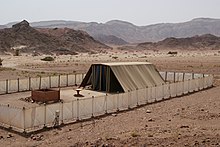
Model in Timna Valley Park, Israel
The people in the wilderness, all members of 12 tribes of Jacob’s descendants, marched in specific order, when the cloud of God lifted from over the tabernacle or His fire in the sky moved at night. Moses had a trumpet sound in two long blasts to alert the people it was time to move out.
A census taken shortly after leaving Egypt, and again just before entering Canaan, indicated about 600,000 Israelite men, aged 20 and over ready for battle in both census, plus all the women and children, flocks and herds and a few others that accompanied them. What a miracle in itself that the nation survived those terrible conditions for that length of time and overcame, even as Israel still does today.
When they reached Kadesh Barnea, about 40 miles southwest of Beersheba, where they stayed for an extended length of time, 12 spies were sent to study the land of Canaan. Upon their return , the people accepted the negative report of 10 spies, instead of the glowing report by two others, Joshua and Caleb.
This led to an open longing to return to Egypt. The people threatened to stone Joshua and Caleb, and demanded new leadership, until punished when the ground opened and swallowed the main rebels. The 10 spies died in a plague.
So God pronounced judgment that everyone, except Joshua and Caleb, 20 years and older would never enter Canaan. Everyone who left Egypt, but those two men, died on that journey.
This led to some confession of sin with the people humbled. They immediately tried to enter Canaan, but were defeated. Theirs was not a true repentance because the people continued to grumble and complain.
Are we doing the same thing? Looking at all the negatives in life, instead of the the blessings, even blaming God at times. Perhaps God is holding back the answer to our prayer requests because of our lack of faith in His goodness and our complaining. Forgive us, LORD.
Not long afterwards, both Aaron and Miriam died and Moses’ attempt to cross the land of Edom was refused. So the people turned south, towards the Gulf of Aqaba, then gradually back up until God’s decision was fulfilled and people died off. 40 long years in the desert, miraculously sustained It was the children of those who left Egypt and their descendants who later became the Jewish nation after they entered the land God promised them.
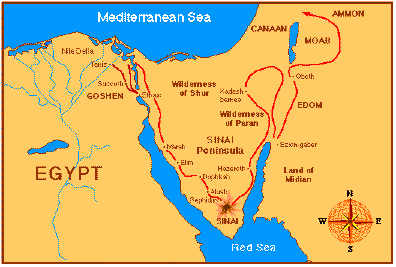
Moses, himself, was not permitted to enter because of one serious sin, but he did see Canaan from the top of Mr Nebo, where he died. Moses gave over leadership to Joshua he had trained, and the Book of Exodus ends with the people at the border, ready to conquer the land. They did march in, and took over the land. Their descendants live there today in the land known as Israel.
The Bible says there will be two great judgments at the end of life. Every person will give an account of their life before God. Nothing will be hidden. Those who now receive God provision of His Son’s shed blood as the sacrifice for one’s sins, and welcomes Jesus’ resurrection from the dead, will be removed from this world at Jesus’ second coming, and not be included in the last Great Judgment of everyone else.
____________________
Trust in the Lord with all your heart. In all your ways acknowledge HIM and He will direct your path. Proverbs 3:5,6
He that cometh to God must believe that He is, and that He is a rewarder of those that seek Him.
I am the way, said Jesus. The Truth and the Life. No man comes to the Father but by me.
Come unto me all you that labour, said Jesus, and I will give you rest.
For God so loved the world, that He gave His only begotten Son, that whosoever believes in Him, shall not perish, but have everlasting life. John 3:16
…………………………………………………………………………………
Do you struggle to understand a Triune God? Think of one egg. It has three parts: the outer shell, which could represent Jesus in that it is visible, physical; inside when broken open there is a clear liquid. Think of the wind which you can feel, but cannot see, like the Holy Spirit which comes to live inside us. Finally, that deep yellow yolk, which could represent the core of it all, the Holy Father. One God in three personalities.
When Jesus rose from the dead, he showed Himself to many people, and even had his disciple, Thomas, touch His hand, to feel and see the nail print scars in His hands. Jesus is alive, not dead. He was all man and all God on earth, but limited Himself for a period so that He might suffer so that we could know our God understands us. He sees us. He knows our name.
Therefore, we also, since we are surrounded by so great a cloud of witnesses, let us lay aside every weight, and the sin which so easily ensnares us, and let us run with endurance, the race that is set before us. Looking unto Jesus, the author and finisher of our faith, who for the joy that was set before Him, endured the cross, despising the shame, and has sat down at the right hand of the throne of God. Hebrews 12: 1, 2

We need daily input from those who have walked the journey and overcame terrible things to find emotional healing and peace in their lives.
I highly recommend watching Joyce Meyer Ministries daily program for teaching and encouragement. Teaching us to trust God, love Him with our whole heart, mind, and spirit, and finding peace within ourselves through God’s inner presence.
![]()
PERSONAL BIBLE STUDY
Charts the Old Testament Kings of the Divided Kingdom – following the death of King Solomon. I & II Kings: I & II Samuel
A Bible Reading Chart For the Year follows at the bottom of the page.
Israel’ History Continues
For those who love history, here is what happened to Palestine when the Israelites struggled to build a nation.
ca 1000 B.C. King David unites the 12 twelve tribes of Israel, then his son Solomon builds a Temple in Jerusalem.
ca 930 BC The Israelite nation divides into two weaker kingsdoms: Israel and Judah. The 10 Northern Tribes called Israel is conquered by the Assyrians about 720 B.C. Judah is destroyed by the Babylonians in 586 B. C.
ca 538 BC Persia conquers Babylon, and permits Jews to return to Jerusalem
ca 167 BC The Jews establish an independent Judaea.
ca 63 BC The Romans establish control over Judaea.
ca 4 BC Jesus is born, lives 33 years and gathers 12 men as followers. These men win others and establish churches across Asia Minor.
AD 70 A Jewish revolt against Rome is put down and the Temple in Jerusalem is destroyed
325 AD The Roman Emperor, Constantine, a Christian, strengthens his own religion throughout the region.
570 The prophet, Muhammad is born in Mecca, establishes the Islamic faith, and dies in 632. His followers spread rapidly through the region of Arabia, Palestine, Persia and Egypt.
1099 The first Crusaders capture Jerusalem, and establish Christian rule over Palestine.
1187 The Egyptians conquer Jerusalem and except for a 15-year interval, Muslims control Palestine until the end of World War I.
1516 The Ottoman Turks take Syria, Palestine and Egypt.
1861 The French establish Lebanon as a district within Syria, under Christian leadership
1882 British forces occupy Egypt and remain there until 1955.
1917 Great Britain, during World War I, issues the Balfour Declaration, promising a Jewish national home in Palestine, with respect to non Jewish residents
1922 After the Ottoman Empire is defeated, the League of Nations confirms British mandates over Iraq and Palestine, and a French mandate over Syria and Lebanon. Transjordan is separated to become an autononomous kingdom.
1936 Palestine Arabs cause a revolt demanding a halt to Jewish immigration, and a ban on sale of land to Jews. British troops attempt to assert control, but violence continues.
1939 Britain announces severe restrictions on Jewish immigration and land purchases, and now Jewish militants cause violence in protest.
1947 Britain leads the United Nations to settle the Palestine problem. The land is partitioned into Jewish, Arab, and International areas (Jerusalem and Bethlehem). 55 % is allocated to the Jewish state. Independent states are Egypt, Syria, Lebanon, and Jordan.
1948 Israelis declare their independence as a nation. The UN General Assembly issues Resolution 194, which asserts that refugees wishing to return to their homes and live in peace in Israel should be allowed to do so, and that compensation should be paid to others, and that free access to holy places should be assured.
1949 Agreements with the Arabs allows Israel to gain more land (77% of Palestine). Egypt occupies the Gaza Strip. Transjordan, renamed Jordan, controls what is left of the west bank of the Jordan River. In 1950 it annexes this territory.
1956 Egypt nationalizes the Suez Canal. Israel joins France and Britain in occupying the Canal area.
1964 The Palestine Liberation Organization (PLO) is established and committed to waging a battle to liberate the homeland of the Palestinian People.
1973 The Yom Kippur War. Egypt and Syria attack Israeli forces in the Sinai and Golan Heights. 16 days of war.
1979 A peace treaty is signed between Israel and Egypt, guaranteeing withdrawal of Israel from the Sinai, normal diplomatic relations, and Israel’s access to the Suez Canal.
1982 The militant Lebanese organization known as Hezbollah is established.
1993 Israel and the PLO conclude a peace agreement in Oslo with mutual recognition and a five-year plan to resolve all remaining differences.
1994 Israel and Jordan sign a comprehensive peace agreement.
1995 Israeli Prime Minister, Yirzhak Rabin, is assassinated by an Israeli right-wing religious fanatic.
2000 Israeli forces are withdrawn from Lebanon
More disputes arise, other governments come into power and leaders die and are replaced.
Read the Bible in a Year
Here is an outline for daily reading.
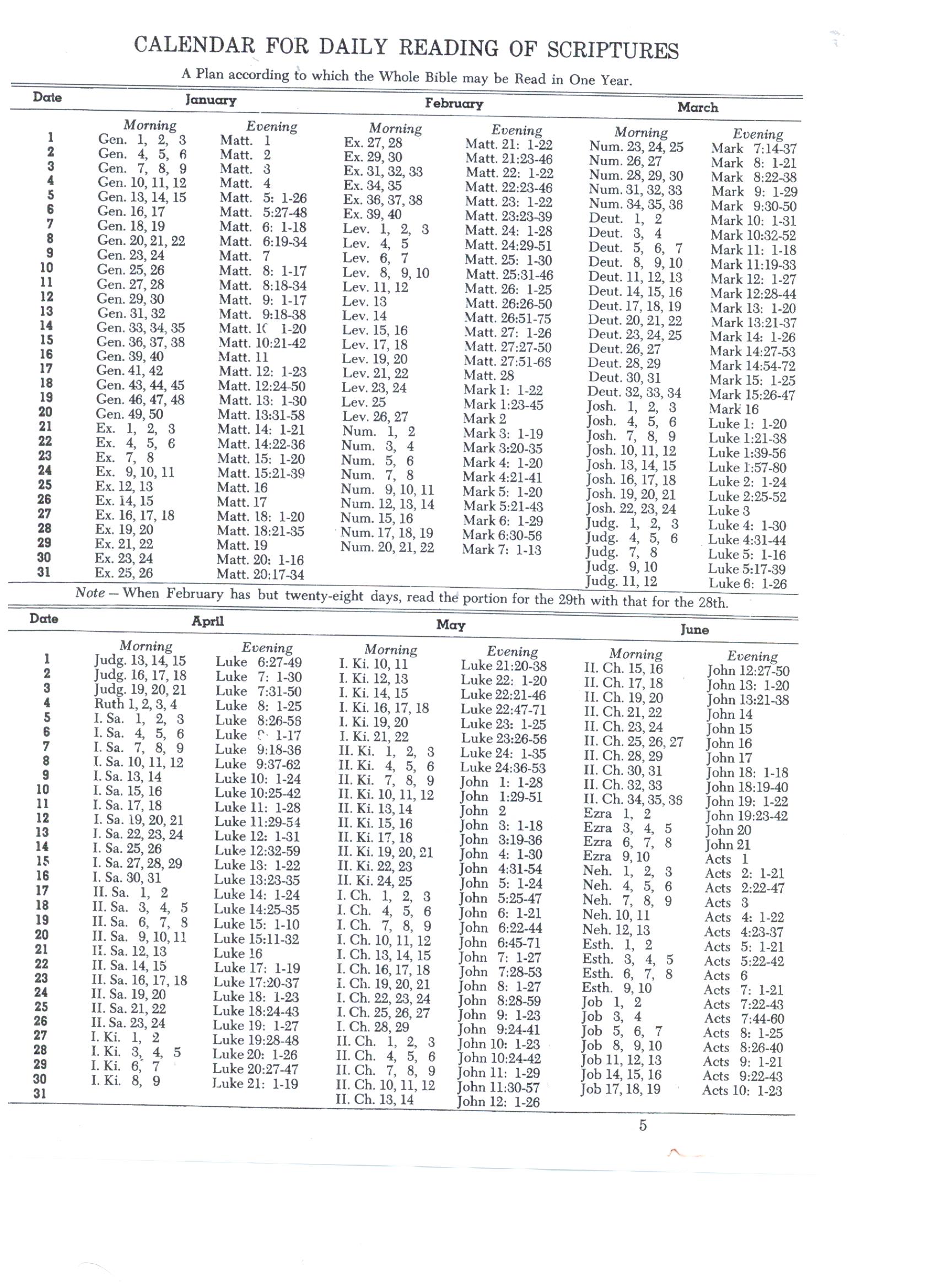
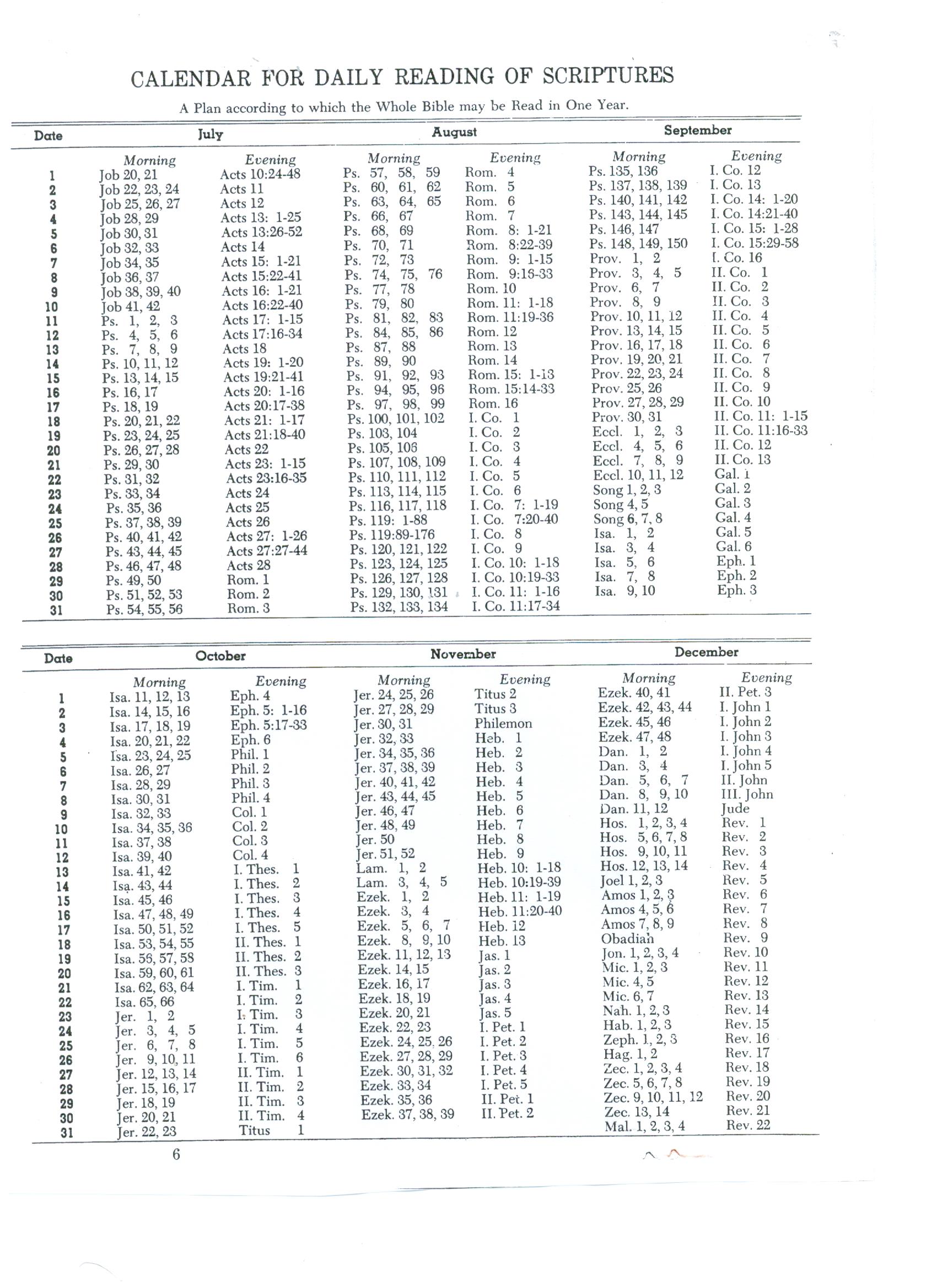
Record Sources: The Holy Bible (many translations); The Old Testament Speaks, by Samuel J. Schultz; The Moody Atlas of Bible Lands by Barry J Beitzel; Harper’s Bible Dictionary. An Atlas of Bible Lands. Halley’s Bible Handbook; Jimmy Carter’s book, Palestine. Peace Not Apartheid; Dr David Jeremiah’s book, The Book of Signs.
![]()